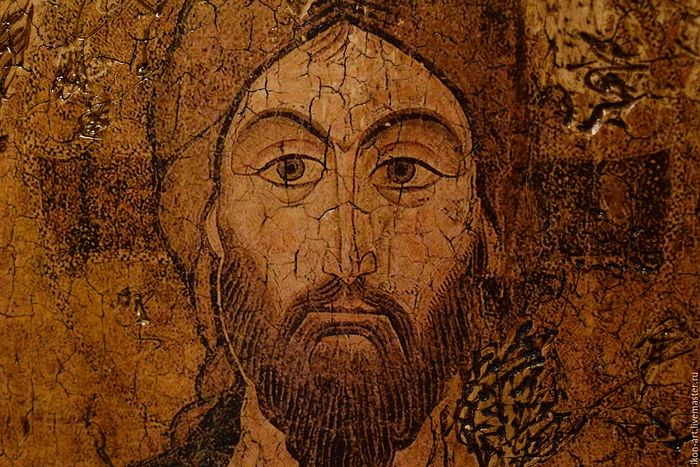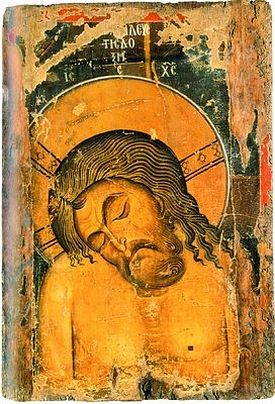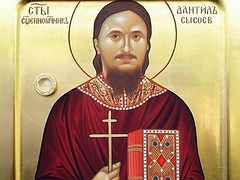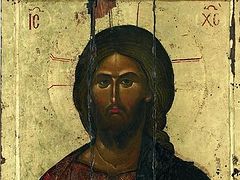The following is the text of a missionary pamphlet distributed by the Moscow-based Holy Prophet Daniel Missionary Movement, founded by the martyred priest Fr. Daniel Sysoev in 2009. The text explains the problem of the human condition and the Orthodox theology of how Jesus Christ came to save fallen mankind, also offering an overview of the Ten Commandments and how to apply them in our lives. The aim is to begin someone on the path towards Christ and to prepare for Baptism in His holy Church. Although not written by Fr. Daniel, the text reflects his sense of sobriety and urgency in bringing others to the faith, and for each of us taking up a serious approach to our lives in the Orthodox Church.
For more on Fr. Daniel, see the article “The Missionary Vision of the Martyred Fr. Daniel Sysoev.”
The Almighty Sovereign of the world created us, people, that we might glory His power and beauty, and, having united with Him, we might become eternal children of God, like unto Himself. But, to our great misfortune, our forefathers departed from the loving Creator and entered into union with Satan. And from that time, all are born impure and inclined towards wickedness, and the devil has authority over our hearts.
Because of this, all people have become mortal in body, after death departing into the black valley of Hell, where indestructible souls are found in an inescapable nightmare. But we are now terminally ill in soul. The mind does not know the Truth, because it wanders in the dark, making innumerable mistakes. The will is deformed by sin, able to do individual good deeds with difficulty, but evil is committed easily. The senses are perverted, and instead of loving the good and hating evil, we, conversely, love that which harms and hate that which brings us benefit.
And so our whole life is meaningless. Can we really live for the sake of something that won’t cross over the bounds of death? Won’t family, children, money, glory, and influence end with the grave? And how can we consider something mortal as the purpose of the life of the immortal soul? No, only in the immortal and loving God can each of us find rest. The purpose of our lives is God Himself. But how can we break through to Him? Can we really break the shackles of death and the fetters of space to meet Him above all the heavens?
But God Himself has intervened in this world. He took pity on us and sent His Eternal Son and Word to save us. God the Word became Man while remaining God. Jesus Christ the Son of God became the one mediator, uniting us with the Heavenly Father. He willingly took upon Himself the punishment for our sins, that all who believe in Him should not perish, but have eternal life. Christ died upon the Cross according to His human nature and by His blood has delivered us from sin, condemnation, and eternal death. Into freedom he led those prisoners of Hell who believed in Him. And on the third day, the Son of God quickened His body and began the process of the General Resurrection. Now death does not forever rule over Christians. We will also leave our graves alive, to live eternally with our Heavenly Father. Christ gave His disciples (the apostles) to authority to loose people from sin and to heal the whole man. Then the Lord Jesus Christ, ascending into Heaven, paved for us the path to Heaven. Now our homeland is there, where is God our Father.
But we have not been left orphans on the Earth. Christ has sent us the Spirit of God Who created the Orthodox Church. In it people of any nationality, descent, or tongue receive forgiveness of sins and learn to live according to God, holy and righteous. And those whose hearts are cleansed by the power of God can see God. The Life-creating power of the Holy Spirit is active in Christians, transfiguring us so that after death, our souls depart not to Hell, but ascend into Heaven, to the lost Paradise. And even the mortal bodies of the righteous pour forth streams of healing, because the life of God is active in them.
But the greatest glory awaits Christians at the end of the world. When the cosmos decays from the evil committed in it by men, then Christ, by the will of His Father, will return to the Earth together with all the saints. The cosmos, engulfed in the fire of the Holy Spirit, will burn, and then God will create a new world, where there will be no more evil, corruption, or death.
The Son of God will revitalize all people, without exception. The righteous will shine like the sun, for in them is hidden that power of God given to them in the Orthodox Church, but sinners will be black as night. The angels will carry Christians on the clouds to meet Christ, and we will be with Him always in His immortal Kingdom, but sinners will be led to the Judgment. Then Christ will reward each according to his deeds. Sinners, and all who have not received Christ, will be cast into the eternal fire which has no light, where there will be weeping and gnashing of teeth.
And now, before it is too late, God commands all people, of all nationalities to bring their repentance before Him, to accept the only Savior for all people—Jesus Christ, and to enter into His one Orthodox Church. How can this be done? First, we must confess the Orthodox faith with all our hearts. It is precisely expressed by the mouth of the Holy Spirit in the Creed. Second, we must repent of all our evil deeds, which are hateful to God. Here is a short list of those deeds which the Almighty forbids under threat of eternal damnation:
1. I am the Lord thy God, thou shalt have no other gods before me. We must love and respect the Lord God more than anything in the world, and worship no one but Him. We must learn about Him and about all that is connected with Him: His Law, the Orthodox Church, and the Orthodox faith. We must pray and live according to His teachings.
Sins: atheism, heresy, communism, magic, visiting healers, astrology (including reading horoscopes), participation in sects, pride, bragging, careerism, conceit, vanity.
2. Thou shalt not make unto thee any graven image, thou shalt not bow down thyself to them, nor serve them. We must not worship idols or serve them, whether directly or indirectly. We must not serve the passions, such as addiction to wealth (greed), gluttony (including gluttony, gourmandy, and drunkenness), pride, and vanity (inflated self-esteem, having a high opinion of yourself, your mind, your beauty, your knowledge, and your wealth). You should welcome the following virtues: the absence of any love for riches, generosity, temperance, fasting, and humility (the absence of egotism).
Sins: idol worship, conjuring spirits, fortune telling, people-pleasing, avarice.
3. Thou shalt not take the name of the Lord thy God in vain. If you have no need, then do not use the name of the Lord in vain, in empty talk, and do not swear by it.
Sins: blasphemy, cursing, not reading the Bible every day.
4. Remember the sabbath day, to keep it holy. Six days shalt thou labour, and do all thy work: But the seventh day is the sabbath of the Lord thy God. We must work six days, and dedicate the seventh to the Lord God. We must not be lazy or waste time in vain.
Sins: skipping Sunday services, working on feasts, slothfulness, breaking the fasts.
5. Honour thy father and thy mother. We must love and honor our parents and heed their good advice. This also applies to all elderly people, and to other people who in one way or another serve as parents: priests, spiritual fathers, teachers, and representatives of the secular authorities. When our parents become old, we must be their support and take care of them.
Sins: offending your parents, not honoring them and not commemorating them in prayer, swearing against the priesthood and authorities, not honoring your elders and teachers, not inviting a priest to come see your relatives before death.
6. Thou shalt not kill. It is forbidden to kill others and to commit suicide. It is prohibited to, in any manner or by bad habits, to shorten your life or the life of others or to cause harm to your health. It is forbidden to show intemperance and to offend others. We must live in peace and harmony with all.
Sins: murder, abortion, anger, abuse, fights, hatred, resentment, rancor, irritability.
7. Thou shalt not commit adultery. It is forbidden to cheat on your spouse or to have any other non-marital or amoral romantic relationship. We must have pure thoughts and desires. We must avoid everything that could excite impure (obscene, sexually-focused) thoughts and feelings (in yourself and in others): dirty jokes, pictures, films, books, songs, dances, clothing, etc.
Sins: adultery, sex before marriage, homosexuality, masturbation, looking at pornography.
8. Thou shalt not steal. It is forbidden to steal, to plunder, or to take anything without the owner’s permission. We must work honestly.
Sins: theft, plundering, fraud, usury, greed.
9. Thou shalt not bear false witness. It is forbidden to lie, to slander, to backbite, to gossip, to break promises, etc. We must be honest.
Sins: perjury, lying, slander, gossip, betrayal, deceit.
10. Thou shalt not covet. It is forbidden to desire anything that is not yours, and it is forbidden to be envious and think poorly of other people. Envy and bad thoughts are the source of bad desires and actions.
Sins: envy, dissatisfaction with your situation, murmuring.
If you have repented of these sins, then you should approach the great Mystery of Baptism, by which all your sins are forgiven and a man is adopted by God Himself. For this, you should go to any Orthodox church, approach the priest, and ask him to be vouchsafed Holy Baptism. People are usually baptized on an empty stomach, eating and drinking nothing from midnight, so as to then unite with God in Communion.
We wish everyone reading this to accept the new birth in Baptism and to receive salvation. Do not hesitate, otherwise you may be too late. There is no more repentance for sins after death.






